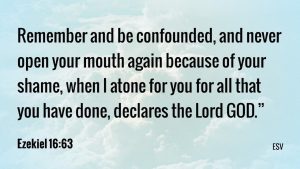 THE HARSHEST criticism of Israel we’ve encountered so far is the focus of this week’s study. God calls the people of Judah a prostitute — except that prostitutes get paid, and Judah, said God, had been whoring with other gods for free.
THE HARSHEST criticism of Israel we’ve encountered so far is the focus of this week’s study. God calls the people of Judah a prostitute — except that prostitutes get paid, and Judah, said God, had been whoring with other gods for free.
Worse, God said His people had actually taken the gifts He’d given them, including children, and sacrificed them to other gods.
And yet, God said a day would come when He would atone for all that they had done — a promise He kept at Calvary.
Book Three of Sharon’s series of supernatural thrillers The Redwing Saga, The Blood is the Life, is available now at Amazon! Here are the links for Book Two of The Redwing Saga, Blood Rites, and Blood Lies: Book One of The Redwing Saga, and here’s the link for Sharon’s author page at Amazon.com.
Derek’s new book The Day the Earth Stands Still: Unmasking the Old Gods Behind UFOs, ETs, and the Official Disclosure Movement, co-authored with Josh Peck, is available now in paperback and as a Kindle e-book! See www.OfficialDisclosure.com for more info.
Derek’s book The Great Inception: Satan’s PSYOPs from Eden to Armageddon is now an e-book for the Kindle and Nook! For free samples, click here for articles from the book, or click here for a series of short (5-10 minute) videos based on the book.
Click here for the complete archive of our New Testament Bible studies to date, and click here for the Old Testament studies to date. Or go to www.spreaker.com/show/gilbert-house-fellowship for all of the audio.

Thank U so much for sharing the Word and the Flow between both of U is heart warming. Yah Bless Ur endeavors in Him. Shalom.
Ps: I enjoy Sci Friday too. U make me laugh and inform my mind. One day I’ll get Ur books Derek, postage and exchange rate is costly to Australia.
Another Brutha in Messiyah.
Shalom.
Raz
Two interesting features to Eze 18:6, 15, and, to a lesser extent, 11.
1) “have not eaten upon the mountains” – This expression is unique to Eze 18. What does it mean? Don’t eat at bamot (“high places”)? Don’t consume with fire upon the mountains (akal can mean to “consume by burning” as well as “eat” – e.g., Num 16:23)? There is also reason to think that at least some mountains (haryim) were thought of as spiritual beings as were the stars. The preposition that begins this verse, ‘al, can also mean “to / towards” as well as “on”. Might this mean “to the (spirits of) the mountain do not eat (or sacrifice)”?
2) “lifted up his eyes to the idols of the house of Israel” – Notice that this passage refers to the idols of house of Israel. Although “idols” (gilulya, more literally, “logs / pieces of wood”) is derogatory, the phrase itself is not specifically condemning the idols that are housed in the (presumably) Temple of Israel. It is condemning the worshiping of or through them. This would seem to confirm other passages that speak of objects representing God in the First Temple through much of its history. Although Ezekiel doesn’t seem to approve of them, nonetheless, he is not denying their legitimacy within the First Temple.
Hi, Geoffrey: That’s an astute observation. There most definitely were spirits that were believed to inhabit certain mountains, especially Hermon and Carmel. Possibly Nebo in the Transjordan as well (Baal-Peor).
On point 2: What verses suggest there were object that represented Yahweh in the Temple?